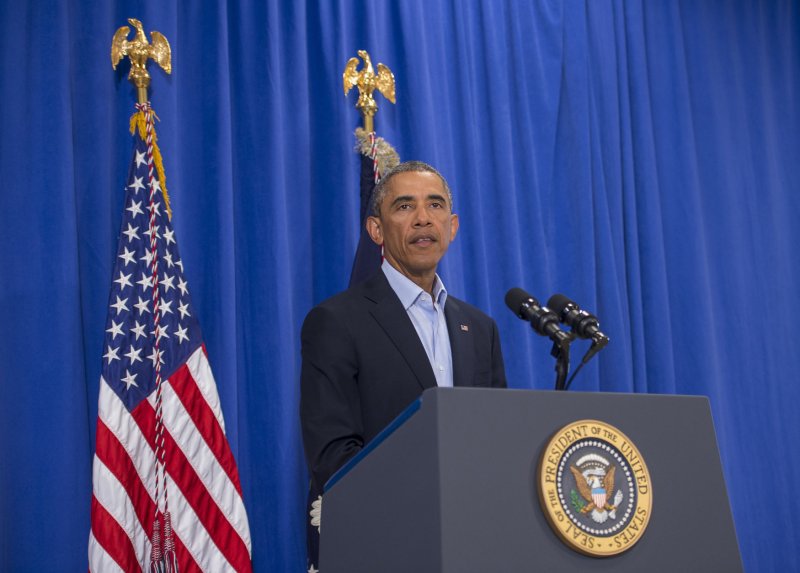President Barack Obama speaks about the execution murder of American journalist James Foley by the ISIS in Iraq, during a press briefing at the press filing center at the Edgartown School in Edgartown, Martha's Vineyard, Massachusetts on August 20, 2014. UPI/Rick Friedman/Pool |
License Photo
Shortly after Operation Iraqi Freedom was launched in March 2003 and the rout of Saddam Hussein's army was assured, competent commentators of all political stripes universally raised the question of "what next," i.e. what to do in Iraq when the fighting ended. The George W. Bush administration was stone deaf. The result was the tragedy that persists today except that it is now on steroids.
President Barack Obama appears to be equally hard of hearing. Many ask, where is his strategy for dealing with the Islamic State (IS) and what is unfolding in the greater Middle East? The world can but wonder.
Given this bipartisan groundswell about a strategy, why has President Barack Obama been so far so reluctant either to explain to the American public what must be done regarding IS or so tardy in producing a strategy to neutralize this danger?
The first reason is that President Obama lacks or is indifferent to the need for real strategic thinking. While he is very intelligent and well-informed, Mr. Obama's thought processes have been dominated and shaped by a pragmatic and incremental pursuit of politics reinforced by legal training and experience that focuses on resolving one case at a time not through a broad strategic solution. Hence, his approach to problem solving follows this step-by-step model.
Other factors contribute to the absence of a strategic mindset and thinking in the White House. Obama's closest advisors in the White House are there for political and personal reasons, not for the ability to think strategically. The last strategic thinker in the White House was national security advisor retired Marine General Jim Jones. But Jones was quickly insulated and bypassed by the so-called "children" in the White House who were far closer in age and relationships to the president. And Jones' successors were selected for skills in which strategic thinking was not the highest criterium.
No one at 1600 Pennsylvania Avenue will admit this but the president is both cynical and certain that the current political and decision-making process in Washington today makes defining and then executing a successful strategy virtually impossible. He has good reason for this conclusion. Virtually all his administration's prior attempts at crafting strategy failed. His greatest foreign policy success was the mission to capture or kill Osama bin Laden. That was not a strategy.
Mr. Obama knows too well how difficult it is to develop and execute a strategy.The Afghan-Pakistan (AfPaK) study of 2009 was the first of many failures to craft a workable strategy. The rollouts of the strategic pivot to Asia and the Affordable Health Care Act were further textbook cases of incompetence in execution. And excess rhetoric is not helpful either. Drawing "red lines" in Syria over using chemical weapons and demanding Bashar al Assad leave office were empty threats not matched by action. Nor did "leading from behind" in Libya reinforce the notion of strong American leadership.
Given this track record, one can appreciate the president's reluctance to be "snake-bit" again. Yet, as his Secretaries of State and Defense, Attorney General and Chairman of the Joint Chiefs all agree, action against IS is needed now. Air strikes alone to support Iraqi security forces or prevent humanitarian crises such as the annihilation of Yazidis on a mountain top cannot and will not defeat IS. Yet the president may wrongly think this is as far public support for military action will go.
Cited for this restraint is so-called "war-weariness." But who is war weary? Fewer than one percent of Americans have gone in harm's way. Those killed or badly wounded in action, however tragic, are relatively small in number. No new taxes to pay for the wars or sacrifices have been imposed on Americans. And the military, which has borne the brunt of these wars, is far from "war-weary" despite repeated deployments.
Ignoring reality risks finding a place atop its rubbish dump. If Obama does not want to become a latter day George W. Bush, he must listen. Bush never asked "what next?" Obama does not yet demand a comprehensive strategy.
Despite an intellectual framework that eschews strategic thinking and an understandable cynicism about fashioning and executing a strategy, Obama has no choice. He must mandate the formation of a comprehensive strategy. Given the White House's repeated failure to execute presidential mandates, he must delegate authority to members of his cabinet who have the skill sets and competence to accomplish the tasks he directs. Otherwise, history will repeat and not for the better.
IS is not Nazi Germany or the Soviet Union. It is, however, a clear and present danger. And the absence of a comprehensive strategy will only make that danger worse.
________________________________________________________________________
Harlan Ullman is Chairman of the Killowen Group that advises leaders of government and business and Senior Advisor at Washington D.C.'s Atlantic Council and Business Executives for National Security. His latest book, due out this fall is A Handful of Bullets: How the Murder of Archduke Franz Ferdinand Still Menaces The Peace.















